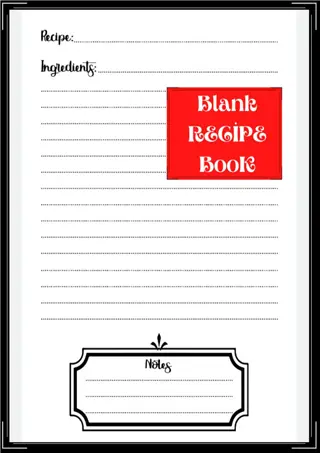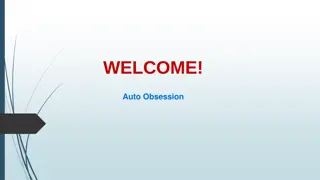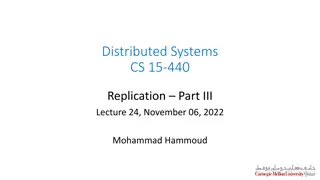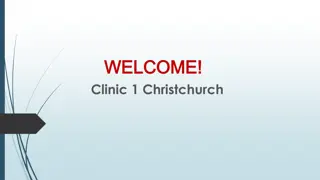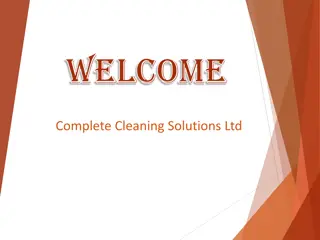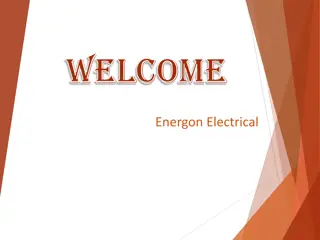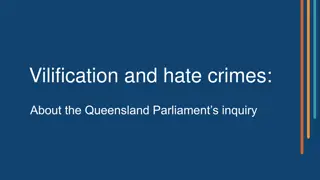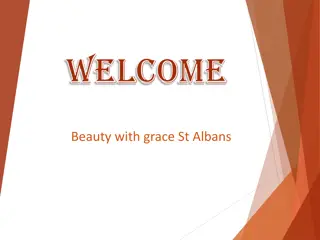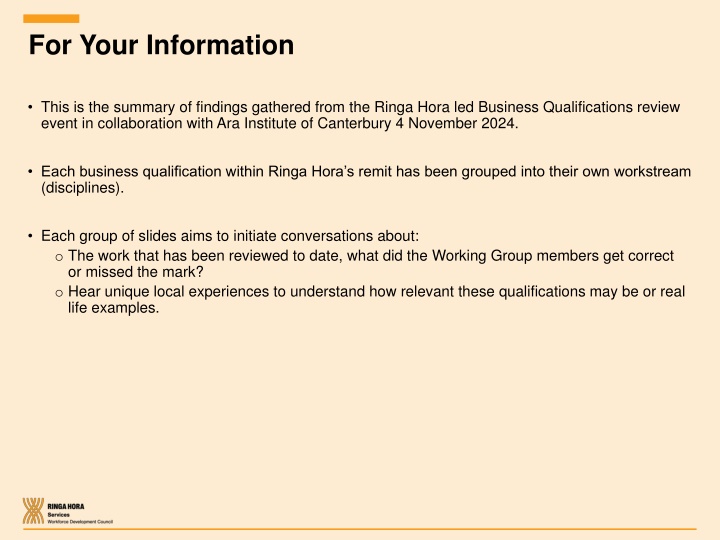
Strategic Business Qualifications Review 2024 Insights
Discover key findings from the Ringa Hora-led Business Qualifications review event held in collaboration with Ara Institute of Canterbury. Insights on vocational qualifications in accounting at different levels and their impact on strategic business roles and professional growth.
Download Presentation

Please find below an Image/Link to download the presentation.
The content on the website is provided AS IS for your information and personal use only. It may not be sold, licensed, or shared on other websites without obtaining consent from the author. If you encounter any issues during the download, it is possible that the publisher has removed the file from their server.
You are allowed to download the files provided on this website for personal or commercial use, subject to the condition that they are used lawfully. All files are the property of their respective owners.
The content on the website is provided AS IS for your information and personal use only. It may not be sold, licensed, or shared on other websites without obtaining consent from the author.
E N D
Presentation Transcript
For Your Information This is the summary of findings gathered from the Ringa Hora led Business Qualifications review event in collaboration with Ara Institute of Canterbury 4 November 2024. Each business qualification within Ringa Hora s remit has been grouped into their own workstream (disciplines). Each group of slides aims to initiate conversations about: o The work that has been reviewed to date, what did the Working Group members get correct or missed the mark? o Hear unique local experiences to understand how relevant these qualifications may be or real life examples.
Ringa Horas coverage Place a post it or sticker on the industry you represent Unit standards Qualifications Providers and schools we moderate Responsible for programme endorsement
Do you represent another industry? Use a post it or write down which industry you represent - Healthcare: Community Homes - Tourism - Technology - Management in trades - Community and social services education - Manufacturing - Food & Beverage - Engineering - Forestry - Print and packaging - MSD Skills for Industry, Partnerships/Contracts
SUMMARY ACCOUNTING Level 6 Outcome: To equip people in New Zealand with business knowledge and skills for strategic business roles. High-level summary of the vocational qualifications that provide an alternative pathway into the accounting profession. Transferable skills into a variety of entities e.g. corporate, community/voluntary, Limited liability company, etc. Aim: Will help achieve business goals ethically and inclusively, respecting the Treaty of Waitangi and working in multicultural environments. They can also pursue further professional credentials. Level 5 Outcome: Entry-level accounting roles in various types of entities. Able to: Core: Apply business principles to develop strategic objectives and plans. Contribute to innovation and organizational change. Build and maintain strategic relationships. Use the Treaty of Waitangi principles in business activities. Follow professional and ethical practices to meet strategic goals. Aim: To help people in New Zealand gain business skills, enabling them to support businesses effectively while respecting cultural diversity and the Treaty of Waitangi. Graduates can also pursue further professional recognition. Level 4 Outcome: Accounting support roles For example: frontline staff, payroll, customer service assistants, treasurers, etc Able to: Core: Analyse business factors for decision-making. Use business knowledge for innovation and change. Build relationships with stakeholders. Apply Treaty of Waitangi principles in business. Follow professional and ethical practices. Aim: Graduates can work in accounting roles with some supervision, respecting the Treaty of Waitangi and working well with people from different cultures. Accounting Prepare financial reports according to standards. Use management accounting tools for decision-making. Apply business finance techniques for planning and control. Use accounting information systems to solve problems. Apply tax rules to various entities and situations. Analyse financial information for strategic decisions. Follow the accounting profession s Code of Ethics. Able to: Use accounting software to produce and share financial information. Calculate and prepare PAYE, GST, and FBT returns; manage accounts payable/receivable, payroll, and admin records. Work with the team to achieve goals. Act professionally, ethically, and responsibly; use personal and interpersonal skills to support accounting services Accounting: Record and process financial transactions. Apply tax rules for individuals and small businesses. Prepare financial statements and reports. Share financial information for decision- making. Create and manage budgets. Assess and control financial and business risks. Follow the accounting profession s Code of Ethics.
EXERCISE 1 RELEVANCE Imagine building the future workforce Based on the summary, have we gotten this right? Or are we still missing things? These capabilities are missing, unclear, or doesn t apply to Which capabilities stand out to you and why? Would you hire Forecasting Social procurement Supporting local economies, understanding purchase power and impact it has on local economy Difficult conversations like change in wage / salary Rural communities may not access the current products, smaller certificates may be more appropriate. Collaborate and contribute to solve problems Assessment control too high level and should be evaluate Teams: working with internal stakeholders or upskill your staff with one or all qualifications? RELEVANT NOT YET my region or entity?
Level 6 SUMMARY ADMINISTRATION & TECH Outcome: To equip people in New Zealand with business knowledge and skills for strategic business roles. High-level summary of the vocational qualifications. Transferable into a variety of entities e.g. corporate, community/voluntary, Limited liability company, etc. Aim: Will help achieve business goals ethically and inclusively, respecting the Treaty of Waitangi and working in multicultural environments. They can also pursue further professional credentials. Level 5 Outcome: Experienced roles in various types of entities. Aim: To help people in New Zealand gain business skills, enabling them to support businesses effectively while respecting cultural diversity and the Treaty of Waitangi. Graduates can also pursue further professional recognition. Able to: Core: Apply business principles to develop strategic objectives and plans. Contribute to innovation and organizational change. Build and maintain strategic relationships. Use the Treaty of Waitangi principles in business activities. Follow professional and ethical practices to meet strategic goals. Level 4 Outcome: Experienced administers Aim: use business technology and handle different administrative tasks, following the principles of the Treaty of Waitangi and working in a multicultural setting. Able to: Core: Analyse business factors for decision-making. Use business knowledge for innovation and change. Build relationships with stakeholders. Apply Treaty of Waitangi principles in business. Follow professional and ethical practices. Level 3 Able to: Outcome: office administration jobs Use tools and methods to help manage parts of business projects. Use mentoring and coaching skills to help the team reach its goals. Use software and technology to do administrative tasks for the organization. Handle and present detailed data to meet the needs of stakeholders. Keep administrative systems running smoothly and suggest improvements. Act professionally, ethically, and inclusively to support the organization Aim: use business technology and handle different administrative tasks, following the principles of the Treaty of Waitangi and working in a multicultural setting. Administration: Plan and manage internal admin systems, processes, and technologies to support strategic goals. Assess new technologies to improve business processes and advise senior management. Handle changes in admin and technology to support strategic goals Administration: Oversee business admin tasks and projects to help meet the organization s goals. Use and support various business technologies to improve performance. Manage and review admin systems and suggest improvements. Able to: Offer business support to help with daily tasks. Handle data and information for business needs. Use effective methods to interact with customers and stakeholders. Act professionally and responsibly, supporting the organization s values and goals.
EXERCISE 1 RELEVANCE Imagine building the future workforce Based on the summary, have we gotten this right? Or are we still missing things? These capabilities are missing, unclear, or doesn t apply to - Understanding legislation e.g. Privacy Act Professional use of technology Privacy of data and personal information on clients Technology - Basic Microsoft apps Which capabilities stand out to you and why? Would you hire - Digital literacy - - or upskill your staff with one or all qualifications? - RELEVANT NOT YET my region or entity?
SUMMARY HUMAN RESOURCE MANAGEMENT High-level summary of the vocational qualifications that provide an alternative pathway into the HRM profession. Transferable into a variety of entities e.g. corporate, community/voluntary, Limited liability company, etc. Level 6 Outcome: To equip people in New Zealand with business knowledge and skills for strategic business roles. Aim: Will help achieve business goals ethically and inclusively, respecting the Treaty of Waitangi and working in multicultural environments. They can also pursue further professional credentials. Level 5 Able to: Core: Apply business principles to develop strategic objectives and plans. Contribute to innovation and organizational change. Build and maintain strategic relationships. Use the Treaty of Waitangi principles in business activities. Follow professional and ethical practices to meet strategic goals. Outcome: Entry-level accounting roles in various types of entities. Aim: To help people in New Zealand gain business skills, enabling them to support businesses effectively while respecting cultural diversity and the Treaty of Waitangi. Graduates can also pursue further professional recognition. HRM Able to: Core: Analyse business factors for decision-making. Use business knowledge for innovation and change. Build relationships with stakeholders. Apply Treaty of Waitangi principles in business. Follow professional and ethical practices. Study HR principles and practices to improve employee performance. Use HR research to help make strategic decisions. Look at trends, including technology, to improve HR areas. Explain HR principles and practices clearly to influence stakeholders, following industry ethics. HRM: Use HR research to help make strategic decisions. Look at trends, including technology, to improve HR areas. Explain HR principles and practices clearly to influence stakeholders, following industry ethics.
EXERCISE 1 RELEVANCE Imagine building the future workforce Based on the summary, have we gotten this right? Or are we still missing things? These capabilities are missing, unclear, or doesn t apply to Which capabilities stand out to you and why? Would you hire Interviewing Recruitment Processes Neuro-diversity and disabilities Highly-skilled but don't interview well Laws Need for practical application to emphasize skills Engaging with communities of practice IEA and CEA | Unions are different Understanding diversity with people Professional development o Process o Analysis o Training o Maintain relevant skills o Attend PD for HR Advisors - - - - - - - - - - or upskill your staff with one or all qualifications? RELEVANT NOT YET my region or entity? -
SUMMARY MARKETING High-level summary of the vocational qualifications that provide an alternative pathway into the Marketing profession. Transferable into a variety of entities e.g. corporate, community/voluntary, Limited liability company, etc. Level 6 Outcome: To equip people in New Zealand with business knowledge and skills for strategic business roles. Aim: Will help achieve business goals ethically and inclusively, respecting the Treaty of Waitangi and working in multicultural environments. They can also pursue further professional credentials. Level 5 Outcome: Entry-level accounting roles in various types of entities. Able to: Core: Apply business principles to develop strategic objectives and plans. Contribute to innovation and organizational change. Build and maintain strategic relationships. Use the Treaty of Waitangi principles in business activities. Follow professional and ethical practices to meet strategic goals. Aim: To help people in New Zealand gain business skills, enabling them to support businesses effectively while respecting cultural diversity and the Treaty of Waitangi. Graduates can also pursue further professional recognition. Able to: Core: Analyse business factors for decision-making. Use business knowledge for innovation and change. Build relationships with stakeholders. Apply Treaty of Waitangi principles in business. Follow professional and ethical practices. Marketing Develop and justify strategic marketing plans, including competitive advantage, digital marketing, analytics, and evaluation. Create and implement engagement strategies with stakeholders, focusing on digital marketing, consumer behaviour, and evaluation. Develop and apply the entity s strategic marketing objectives, including positioning, branding, internationalisation, and evaluation. Improve the entity s strategic efficiency and effectiveness with marketing principles and processes. Use creativity and integrated marketing communication for effective marketing outcomes Marketing: Apply fundamental marketing principles Marketing techniques and strategies Conduct market research: Use technology and platforms to engage with customers or consumers Develop a marketing plan advising management on existing and emerging marketing Issues
EXERCISE 1 RELEVANCE Imagine building the future workforce Based on the summary, have we gotten this right? Or are we still missing things? These capabilities are missing, unclear, or doesn t apply to Storytelling - As we can t always compete on price need to focus on value positioning Which capabilities stand out to you and why? Would you hire or upskill your staff with one or all qualifications? Trends vs. issues RELEVANT Results vs. outcomes - Interpreting their marketing results NOT YET my region or entity? Ethics - Privacy around data and handling of customer information Micro-credentials - In Selwyn District we are the fastest growing population in NZ, large youth & older population in need of district training
SUMMARY M ORI BUSINESS AND MANAGEMENT This discipline aims to understand how best to support M ori clients, colleagues, and wider business community. This is what we have gathered as top of mind for Maori business and management Intellectual Property and Legal Considerations Inter-generational wealth: Building and maintaining family wealth. Sustainability, kaitiakitanga, environment: Practicing environmental stewardship. Empowering collective: Strengthening community through shared resources. Taranaki pov: good partner with iwi, hapu, and non-M ori community: Fostering inclusive partnerships. used within iwi, hapu, PSGE can inform how businesses are run: Learning from M ori ownership structures Cultural and Indigenous Considerations Business Development and Entrepreneurship Wealth and Sustainability Education and Mentorship Appealing and motivating outcomes post- qualification: Highlighting benefits of education. Where to go to for help: Identifying support resources. A qual by M ori for M ori | a qual about M ori for all: Developing inclusive educational qualifications. Mentoring tuakana/teina: Providing and receiving mentorship. Tuakana-teina model embedded: Implementing traditional mentorship models. Generational transfer of knowledge: Passing down expertise and wisdom. Entrepreneurship: Starting and managing new business ventures. Managing whanau owned business: Overseeing family- owned enterprises Succession planning: Preparing for leadership transitions. Exit strategy: Planning for business sale or closure. Negotiation: Effectively reaching agreements. Pitching for work: Presenting business proposals. Procurement: Acquiring goods and services. Collaboration: Working jointly with others. Measuring impact of your business for your customers: Assessing business outcomes. How to build/develop M ori conceptual frameworks for good business practice, decision-making, organizational structure: Creating culturally-informed business models. Partnership, management, referrals: Building and managing business relationships. Build capability and skill sets internationally: Expanding skills for global markets. Build a network of M ori businesses: Connecting with other M ori enterprises. How M ori contribute to the economy and iwi: Understanding M ori economic impact. Barrier to sell indigenous food: Navigating challenges in indigenous food markets. What can be commercialised without losing tapu/mana: Balancing commercialisation with cultural integrity. WAI 262 what is it?: Knowledge of indigenous intellectual property rights. Te Tiriti in practice: Applying the Treaty of Waitangi principles. What is mine vs. n tatou: Distinguishing personal vs. collective ownership. Non-M ori perspective: how to be intentional and communicate with M ori: Effective cross-cultural communication. Non-M ori perspective: diverse ownership models IP: Protecting intellectual property rights. Remove barriers understand prohibitors for M ori: Identifying and overcoming obstacles.
EXERCISE 1 OPPORTUNITY Imagine building the future workforce How can you support M ori businesses? what else do you think is important for M ori and how can you support Maori business Being culturally aware and why cultural practice to engage with others / customers Networking opportunities are small in the region but needed to share information, resources, and utilise people where needed There is an increase in small businesses returning to growing their land forestry, fishing, and farming Non-M ori need to acknowledge protocol and format will be different when engaging with M ori businesses and should adjust and anticipate their approaches New information e.g. Funding For use. In two apprenticeships M ori entrepreneurship is important in the Selwyn District Can other provide opportunities to trade at all levels of the value chain Access to productive resources Understanding business set-up and start-up Funding awareness for M ori businesses to access Mentoring opportunities M ori economic development is a key pillar in our society Supporting rural and urban M ori close to marae and whanau Runanga connection Support in education for the 1st or 2nd year as needs increase Time Priorities are different based on their commitments in their community There is a desire to elevate M ori rangatahi into business and encouraging them to brainstorm ideas or take their idea to setting up a business From a M ori business owner, the lens that business is business; business owners are business owners The distinction that M ori business and M ori business owners are any different to other businesses. In the business world, they are all business owners and run their own business. Their approach to running their business is unique. The North Island and South Island need to get better at national business , building connection, and accessing similar support services for businesses Partnerships with the right mentors South Island is more scattered so needs and resources are different Adjust my approach when engaging and support M ori businesses Listen Support diversity in the workplace Support indigenous languages in the workplace Be comfortable and learn from mistakes Ongoing coaching Businesses are engaging with Iwi to be educated in M ori frameworks that encourage healthier engagement approaches with Iwi How can you support M ori Business? What do you think is important to M ori? REFLECTION SUPPORT
SUMMARY SMALL BUSINESS High-level summary of the vocational qualifications that provide fundamental knowledge and skills to establishing a business OR structures in place to manage your business. Level 4 Outcome: Business ownership now and in the future Aim: start, run, grow, and sustain a small business. Graduates will be able to use their business knowledge and skills in line with the principles of the Treaty of Waitangi and in a multicultural setting. Level 3 Outcome: Assess business opportunities. Able to: Use knowledge of ownership structures to start, run, and grow a small business. Create a business plan that is suitable for external stakeholders and supports a viable business idea, including details like finances, HR, marketing, technology, sales, risk management, and regulations. Run and manage a small business to improve performance and meet stakeholder needs. Act professionally, ethically, and inclusively when managing a small business Aim: equip people in New Zealand to assess small businesses. They will learn how to start a small business following the principles of the Treaty of Waitangi and in a multicultural setting. Able to: Find small business opportunities that match your skills, interests, and preferences. Evaluate if a small business idea is practical and likely to succeed. Understand the importance of building good relationships with stakeholders. Act professionally, ethically, and inclusively when assessing a small business.
EXERCISE 1 RELEVANCE Imagine building the future workforce Based on the summary, have we gotten this right? Or are we still missing things? These capabilities are missing, unclear, or doesn t apply to - - Filing tax Knowing who to go to as small business owners to seek assistance (financial, capability, resources) Which capabilities stand out to you and why? Would you hire or upskill your staff with one or all qualifications? RELEVANT NOT YET my region or entity?
KEY: Attendees were presented with high-level topics and skills that is embedded across the qualifications within each workstream Existing skills and knowledge the qualifications already include These circles and additional insights list is what attendees added at the event Ringa Hora | Power of Three Business Qual Workshop
SUMMARY MANAGEMENT The review for Management has launched. We would like to acknowledge the link between Management and Leadership Differences Crossover Management: Focuses on administering and maintaining systems Leadership Focuses on influencing and guiding people Decision-making: Both need to make important decisions for their teams and organizations. Communication: Clear communication is essential to share goals, expectations, and feedback. Problem-solving: Both must tackle challenges and find solutions. Team development: Both roles involve growing talent and building strong teams. Goal setting: Both set objectives, though the scope may vary. Resource allocation: Both need to distribute resources effectively to meet goals. Change management: Both guide and implement changes. Performance evaluation: Both assess the performance of individuals and teams. Conflict resolution: Both address and resolve team conflicts. Ethical responsibility: Both uphold ethical standards and foster a positive culture. Emphasizes planning, organizing, and controlling Emphasizes vision, inspiration, and motivation Concerned with achieving short-term goals and objectives Concerned with long-term direction and strategy Relies on personal power and influence Relies on formal authority and position power Tends to be more strategic and people-oriented Tends to be more tactical and process-oriented
Manage people remote vs. office IDENTIFY SKILLS UNIQUE TO MANAGEMENT Onboarding new clients What s changed? What s new? What s missing? managing workflows Compliance Management Building relationships Succession planning Coaching Performance management Effective communication How to help people if they find themselves in roles that don t suit them Time management Team Self Data and analytics Systems management Disciplinary processes Understanding values and needs between own & business Contingency planning Continuous improvements Change management Disruptions BAU changes Strategic overview Soft skills Listening Empathy Report writing Feedback Receive give Resource Management communicating with stakeholders Management Health & Safety Self awareness Motivating team members Sustainable management business planning and improving productivity Decision Making Career development and career progression Psychosocial health and wellbeing Working outside meetings minimising interruptions and manager time
Types of sales informs how to manage customers Urgency to act - - - Dealing with rejection Sampling and experiential Presentation: - Personal presentation - Attractive presentation of product | service Broader economic outlook that may influence Interviews you are selling yourself Consumers are savy - Understand the psychology of sales - Information is available to potential customer Phone skills Cold calling People skills Direction & agile Passion & drive Writing skills Questioning: - Asking hard questions - Asking the right questions Predict the problem before it becomes a problem Types of sales comes with managing these types of customers Customer Relationship Management Market research: - Identify opportunities - Product knowledge - Environmental scan B2B, B2C, E- commerce, Channel sales sales strategy Analyse and read data - - adapt your approach to build rapport and connect with clients - sales process and tools Sales Active listening and moving the conversation forward / upselling - - - - - - - Forecasting Commercial and Financial Acumen Negotiation Developing Personal Resilience, Using Legal, Regulatory and Ethical Frameworks Buyer understand their needs, motivations, and decision-making processes Leverage marketing to support sales process Larger entities have additional resources and tasks - Sole trader sells their own business and their products
Te Manu Arataki Enhance the offering of generic leadership credentials on the NZQCF to: - - make pathways clearer, more visible, and more cohesive; more regionally responsive to ensure relevancy, higher enrolment and completion, more meaningful learners and industries; meet the needs of M ori learners with more evident and recognition of m taurangaM ori; meet the needs of Pacific learners; meet the needs of tangata whaikaha learners. - - - Resources: Subject matter expertise from Industry, Providers, Associations, Networks, M ori, Pacific, Tangata Whaikaha, Peak Bodies Environmental Scan Summary of Engagement Findings New Zealand Qualifications and Credentials Framework April 25 Ringa Hora Workforce Development Council |
Level 6 Level 5 SUMMARY Leadership Outcome: The purpose of this qualification is to provide Aotearoa New Zealand with people who have advanced leadership knowledge and skills that can be applied in a range of strategic organisational contexts. Outcome:The purpose of this qualification is to provide Aotearoa New Zealand with people who have business knowledge and skills that can be applied in a range of operational business contexts. Level 4 Level 3 Outcome:The purpose of this qualification is to provide Aotearoa New Zealand with people who can lead teams and workflows to achieve objectives in a leadership role. Able to: Outcome: This is an introductory qualification intended for people who are aspiring to be or are currently new leaders. The qualification will provide Aotearoa New Zealand with people who have the introductory skills and knowledge to be a confident and effective leader. - Evaluate the impact of current influences on operations and make strategic recommendations to support an organisation s performance. Able to: Core: Analyse business factors for decision-making. Use business knowledge for innovation and change. Build relationships with stakeholders. Apply Treaty of Waitangi principles in business. Follow professional and ethical practices Able to: - Lead others to establish and achieve objectives. Develop self-reflection and self-assessment to enhance leadership practice. Assess situations and respond effectively within a leadership activity. Promote an inclusive environment to value diversity for positive performance for the organisation. Communicate to develop effective relationships with team members. - Lead people to enable achievement of strategic organisational goals to support an organisation s performance. Implement continuous improvement strategies to support an organisation s performance. Lead and implement change to support an organisation s performance. - Able to: - Adopt self-reflection in leadership practice within own roles and responsibilities. Identify and apply organisational core values and objectives to people-led activities. Communicate effectively in a socially and culturally responsible manner within a leadership context. Apply effective problem- solving and contribute to decision-making for organisational purposes. Behave professionally and ethically to support organisational values in a leadership context. - - Strand - - Lead with kaitiakitanga to identify operational challenges and apply techniques for continuous improvement to support the entity's performance. Lead others to implement activities, including change processes, within the entity's plans to support its performance. Implement strategies for a positive workplace culture and team engagement to value diversity to support an entity. - - - Develop and evaluate strategies for a positive workplace culture and team engagement to value diversity and to support an organisation s performance. - - - - - - - Apply communication, interpersonal, and influencing techniques to support an entity's performance. Ringa Hora Workforce Development Council |
Feedback Leadership 1.Do you see your kaimahi/learners/communities under the strategic purpose statement and graduate profile outcomes? 2. Are these the leadership skills relevant for your current and future leaders? 1. Who do you see in these quals? 2. Relevancy of leadership skills For level 3- remove introductory L3- can see this is for ppl coming into the qualification L4- can see that these leaders are able to do the mahi L4- should have more technical focus rather than achieve objectives in a leadership role Micro-credentials are key L4 can make specific decisions on a project Support to separate leadership and management Can see the step up between the levels. Good feedback on alignment to the leadership positions of a company Management is task-related Teachers- leading a class An example of pre-trade apprenticeship do apprenticeship This would work for Committee leadership L3 teaches values Sport coaches at L3 L3- upholds values of the business. L3 would work for Volunteer organisations this would give them some structure Level 4 strategic purpose statement seems too vague. Someone hiring a manager needs 5 to 10 years experience Need to be able to understand the business A good leader doesn t necessarily need to be able to work the tools or have subject knowledge Ringa Hora Workforce Development Council | NZQA- quality assured


